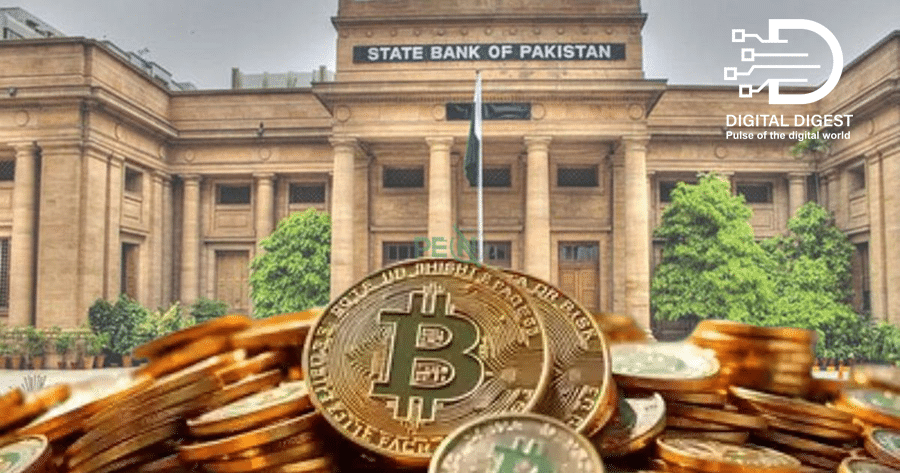Pakistan to Legalize Cryptocurrency with Digital Rupee and Virtual Asset Bill 2025
Table of Contents
ToggleThe State Bank of Pakistan (SBP) has officially announced its decision to legalize cryptocurrencies under a regulated framework, marking a historic shift in the country’s financial policy. Alongside this move, the central bank is preparing to launch a digital rupee, a central bank digital currency (CBDC) aimed at enabling safe and transparent transactions within Pakistan.
This decision comes after years of uncertainty surrounding digital assets, where cryptocurrency trading and investment operated in a legal gray area. With this regulatory breakthrough, Pakistan is set to join the global movement toward blockchain innovation and secure digital transactions.
SBP to Withdraw Advisory Against Cryptocurrencies
During a Senate Finance Committee briefing chaired by Senator Saleem Mandviwalla, Deputy Governor Dr. Inayat Hussain confirmed that the advisory declaring cryptocurrency illegal will soon be withdrawn. He clarified that Pakistan’s upcoming framework will not only allow controlled investments in digital assets but also ensure compliance with global financial standards.
Dr. Hussain emphasized that the digital rupee will be the only central bank-backed currency in circulation. Through this initiative, citizens will be able to purchase and hold cryptocurrencies legally, but under a regulated system designed to minimize risks such as fraud, money laundering, and market manipulation.
Pakistanis Already Hold $21 Billion in Crypto
Senator Afnanullah Khan highlighted the scale of Pakistan’s cryptocurrency involvement, revealing that Pakistanis have already invested nearly $21 billion in cryptocurrencies despite regulatory restrictions. This significant figure demonstrates the strong demand for digital assets among the population and the need for a clear legal framework to protect investors.
By introducing structured regulations, the government aims to transform cryptocurrency from a risky underground activity into a secure, government-supervised investment opportunity.
Virtual Asset Bill 2025 to Regulate Digital Assets
The government plans to introduce the Virtual Asset Bill 2025, which will apply nationwide. A legal consultant from the Ministry of Law and Justice confirmed that the bill will establish a Virtual Asset Regulatory Authority (VARA).
This new body will be responsible for:
Issuing licenses for cryptocurrency exchanges and service providers
Developing regulations for safe trading
Monitoring transactions to prevent illegal activities
Setting guidelines for investor protection
According to Barrister Syed Shehroze, virtual assets will be transferable and usable across Pakistan, but they will not be allowed for purchasing goods, services, or making investments outside the official ecosystem. This restriction ensures that crypto activity remains within a controlled financial environment, aligned with national monetary policies.
Digital Rupee: Pakistan’s Central Bank-Backed Cryptocurrency
One of the most significant aspects of this reform is the creation of the digital rupee, Pakistan’s own central bank-backed digital currency. Unlike private cryptocurrencies, the digital rupee will be fully controlled and issued by the State Bank of Pakistan, ensuring transparency and security.
Officials confirmed that the SBP is already working with technology vendors to design and launch the digital rupee system. Special offices will be established in Pakistan to handle digital currency transactions, offering citizens a safe way to enter the digital economy.
Customer Protection and Security Safeguards
The Virtual Asset Bill 2025 also introduces several safeguards to protect investors and ensure secure transactions. These include:
Strong KYC (Know Your Customer) regulations
Secure digital wallets for holding cryptocurrencies
Licensing requirements for exchanges to prevent scams
Transparent reporting and audit mechanisms
By enforcing these measures, Pakistan aims to prevent financial crimes while encouraging safe digital investments.
Why Cryptocurrency Legalization Matters for Pakistan
Pakistan’s move toward cryptocurrency legalization holds major economic significance. It could:
Boost financial inclusion by allowing millions of unbanked citizens to access digital payments.
Attract foreign investment into Pakistan’s fintech and blockchain industries.
Increase tax revenues through regulated cryptocurrency trading.
Enhance transparency by shifting informal crypto activity into a legal framework.
Experts believe that the legalization of cryptocurrencies, combined with the introduction of the digital rupee, could make Pakistan a key player in the regional digital economy.
The legalization of cryptocurrency in Pakistan under the Virtual Asset Bill 2025 marks a turning point in the country’s financial landscape. With the State Bank of Pakistan launching a digital rupee, a dedicated Virtual Asset Regulatory Authority, and strict safeguards in place, citizens will soon have a secure and legal path to invest in digital assets.
As Pakistan embraces this digital transformation, the move is expected to unlock new economic opportunities while protecting investors and aligning the nation with global financial innovation trends.







